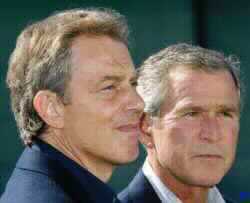HIGHLIGHTS: Germany & France Agree They're Opposed to Military Action against Iraq||Bush Calls Saddam a 'Tyrant', Discusses Ousting the Iraqi Leader with Blair & Plans to Challenge UN to Take Quick, Tough Action to Disarm Iraq||Bush & Blair Cite Unverified Past & Present IAEA Reports as Evidence against Iraq||Iraq Accuses Bush of Cheating the World adding Washington's Motive is to Control Iraq's Oil||Bush & Blair Face Tough Opposition to their Policy on Iraq Both Internationally and on The Domestic Fronts in the United States and the United Kingdom||British Press Dubs Bush-Blair Meeting as 'Council of War'|| STORY: The U.S. and British leaders expressed concern on Saturday that Iraq was developing nuclear weapons and said before a joint strategy session that there was sufficient evidence to act against President Saddam Hussein.
U.S. President George W. Bush and British Prime Minister Tony Blair cited security reports of new construction at sites previously linked to Baghdad's weapons programs and intelligence about Saddam having been close to acquiring nuclear capability as evidence to support action against Iraq.
But Baghdad, which denies it is developing weapons of mass destruction, accused Washington of plotting to control Iraqi oil, while Germany and France agreed they were opposed to unilateral U.S. military action.
Blair, Washington's staunchest ally in its escalating campaign to disarm Iraq either through tough inspections or military force, paid a flying visit to confer with Bush at the Camp David presidential retreat ahead of the president's speech to the U.N. General Assembly, to find a way to neutralise the perceived threat posed by Saddam.
Bush, who advisers said will challenge the United Nations to take quick, tough action to disarm Iraq or possibly face the United States acting alone to remove Saddam, called the Iraqi leader "a tyrant" and said he would discuss with Blair ways of ousting him.
"There's all kinds of ways to change regimes," Bush said. "This man is a man who said he was going to get rid of weapons of mass destruction, and for 11 long years he has not fulfilled his promise. And we're going to talk about what to do about it."
NEW SATELLITE INTELLIGENCE
Talking to reporters before opening three hours of talks, Bush and Blair pointed to an International Atomic Energy Agency report released on Friday that said satellite photos of Iraq had identified new construction at several sites linked in the past to Baghdad's development of nuclear weapons.
They also cited a 1998 report from the same Vienna-based regulatory arm of the United Nations that said Saddam could be six months away from developing nuclear weapons.
"I don't know what more evidence we need," Bush said.
Blair, who called the threat from Saddam "very real", said: "We only need to look at the report from the International Atomic Energy Agency, showing what has been going on at the former nuclear weapon sites to realise that and the policy of inaction is not a policy we can responsibly subscribe to."
In Jordan, Iraqi Information Minister Mohammed Saeed al-Sahaf told a news conference Bush was cheating the world by saying Baghdad posed a threat.
The real U.S. motive was to seize control of Iraqi oil, he said, saying any U.S. military action to oust Saddam would fail.
Bush, seeking an international coalition to back his plans on Iraq, on Friday phoned the leaders of France, Russia and China, whose nations with the United States and Britain hold veto powers in the U.N. Security Council. He got little encouragement for an attack on Baghdad.
The British media have portrayed Saturday's talks as a "council of war" to light the fuse for a military conflict targeting Iraqi weapons and seeking Saddam's removal.
Apart from Blair, who has hinted strongly that Britain was prepared to go to war alongside the Americans, the Bush administration is facing widespread opposition internationally and also within the Republican Party.
Blair is not without opposition either. A poll released in Britain on Sunday showed 60 percent of Britons believed their country should play no part if the United States launched military action against Iraq without U.N. backing.
PHOTO CAPTION
U.S. President George W. Bush (R) and British Prime Minister Tony Blair talk to the media at Camp David, the presidential retreat in Maryland, on September 7. REUTERS/Win McNamee
- Author:
& New Agencies - Section:
WORLD HEADLINES


 Home
Home Discover Islam
Discover Islam Quran Recitations
Quran Recitations Lectures
Lectures
 Fatwa
Fatwa Articles
Articles Fiqh
Fiqh E-Books
E-Books Boys & Girls
Boys & Girls  Ramadan
Ramadan Fatwa Audios
Fatwa Audios Month of Mercy
Month of Mercy Women
Women Eed Al- Fitr
Eed Al- Fitr Food Recipes
Food Recipes Videos
Videos

 Prayer Times
Prayer Times












